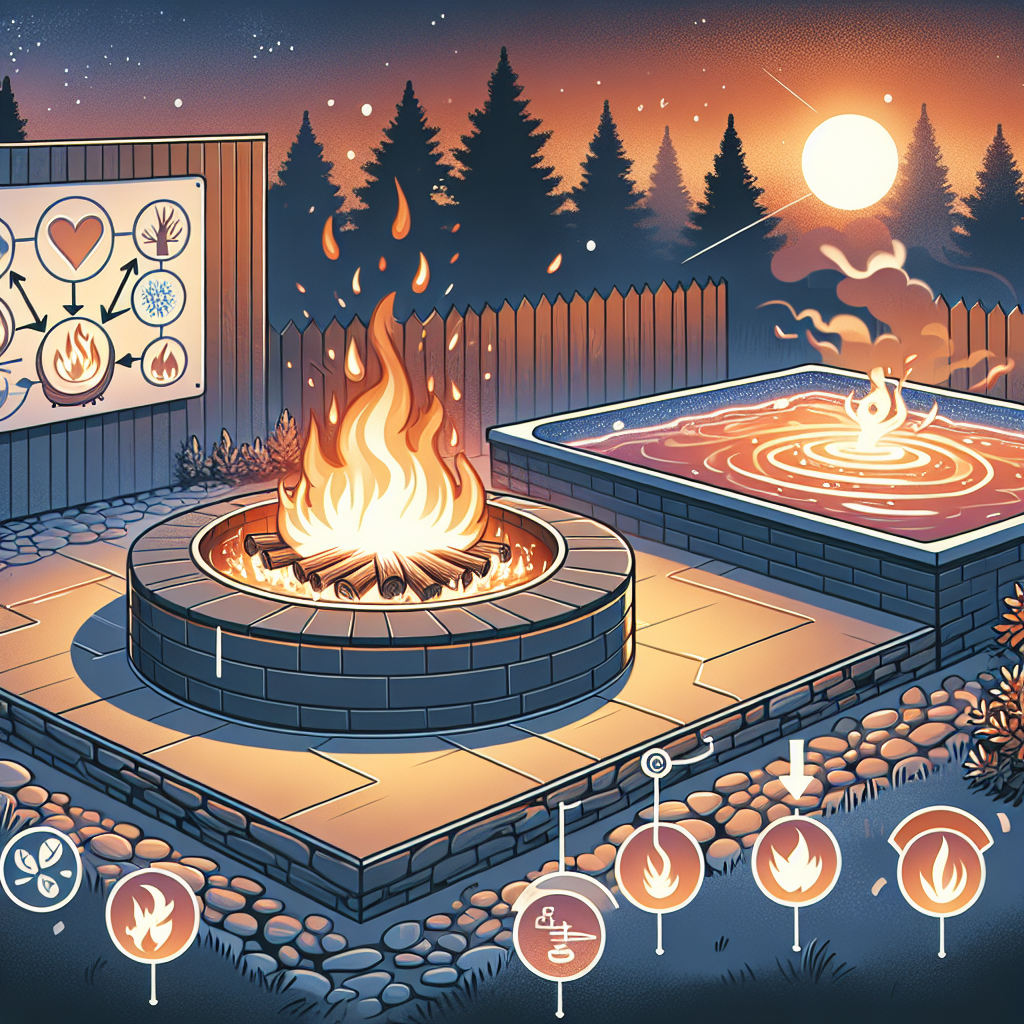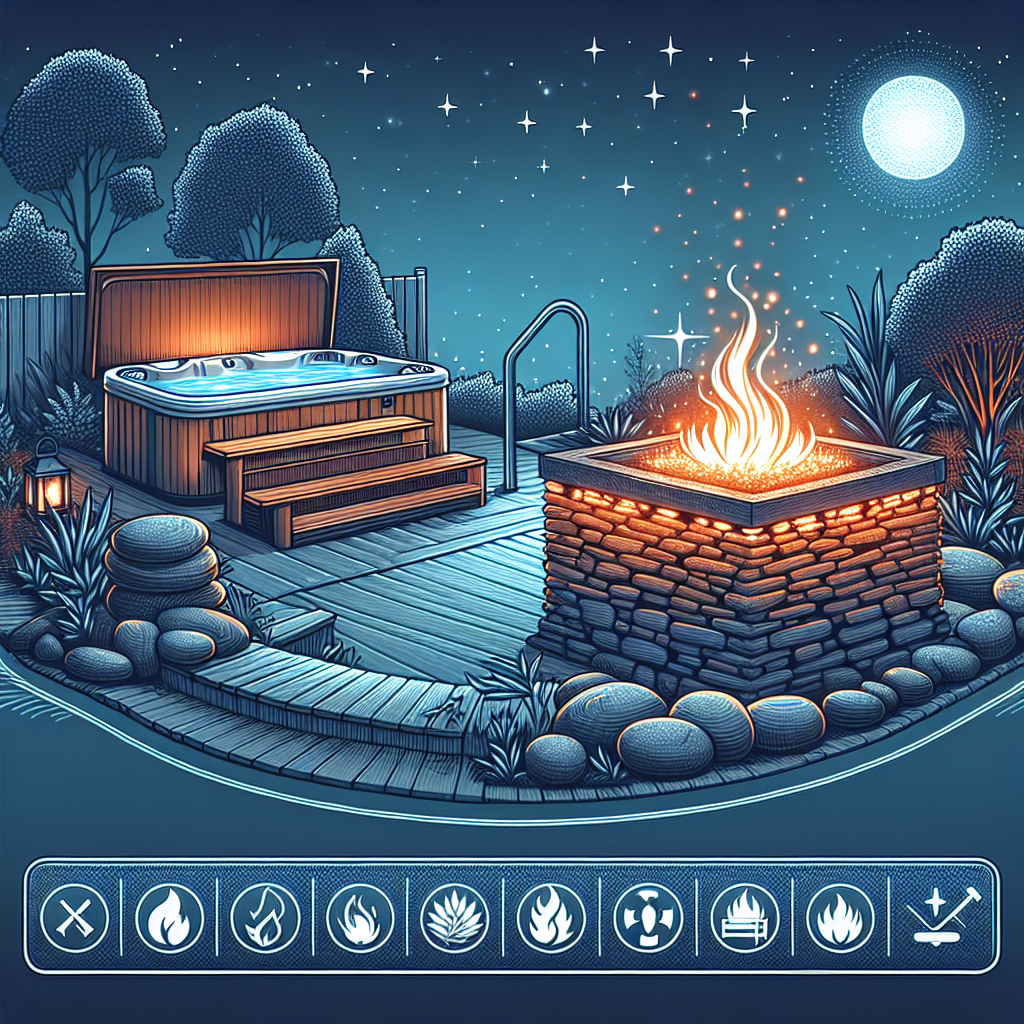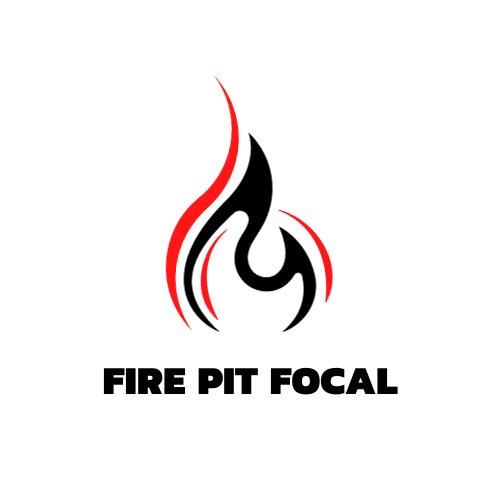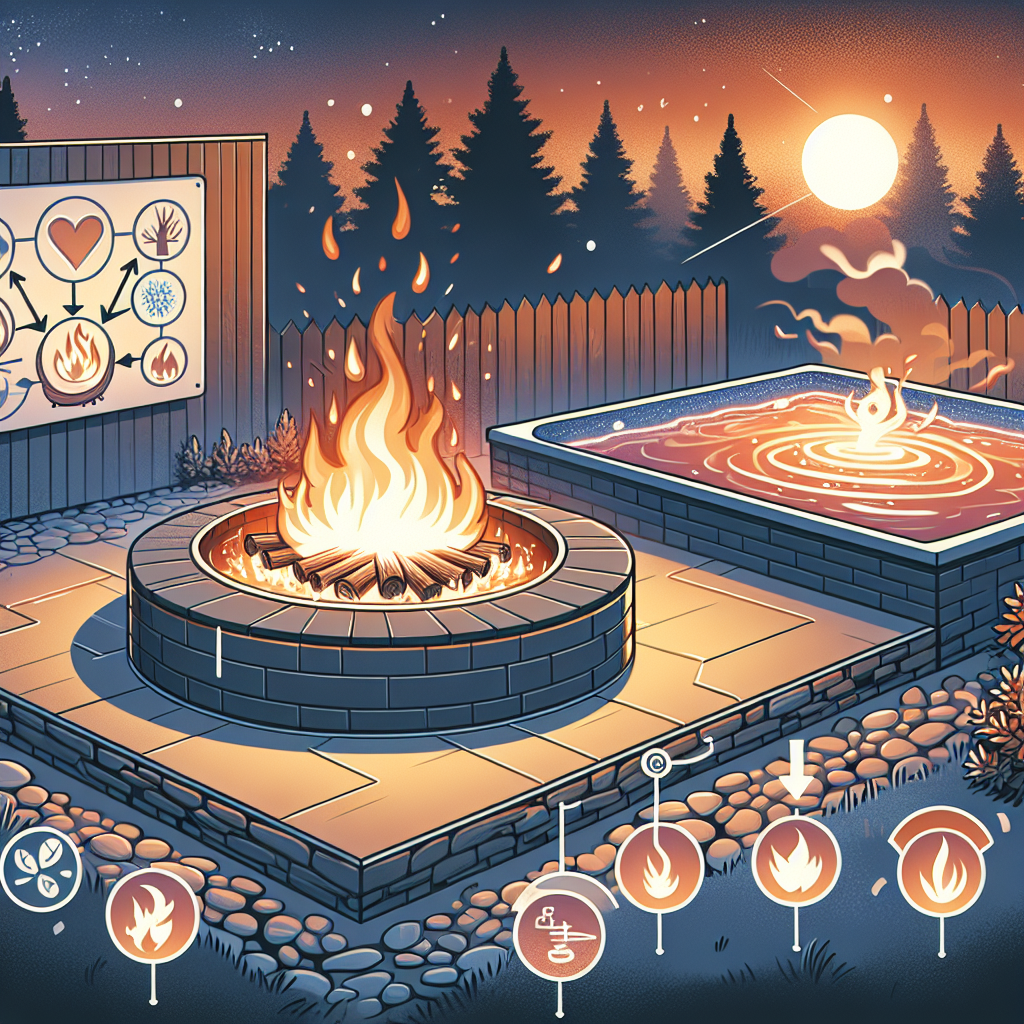So, you’ve got a cozy fire pit in your backyard that brings warmth and a delightful ambiance to your outdoor gatherings. But have you ever wondered if you can take it a step further? Can you use your trusty fire pit to not only create a cozy atmosphere, but also heat up your hot tub or spa area? Well, my friend, the answer might just surprise you! In this article, we will explore whether or not it’s possible to use your fire pit as a source of heat for your hot tub or spa, and if so, what precautions you need to take to ensure a safe and enjoyable experience. So grab a cup of hot cocoa, sit back, and let’s dive into this fiery exploration!

Building a Fire Pit
If you’re considering using a fire pit to heat your hot tub or spa area, it’s important to start by building a proper fire pit. This will ensure safety and efficiency when it comes to heating your outdoor space.
Choosing the Right Location
The first step in building a fire pit is to choose the right location. You’ll want to select an area that is away from any flammable materials or structures. Make sure the location is also far enough from your hot tub or spa to prevent any damage caused by excessive heat.
Determining the Size
The size of your fire pit will depend on the size of your hot tub or spa area and the heating needs you have. A larger fire pit will generate more heat, so take into consideration the dimensions of your outdoor space and the amount of warmth you desire.
Selecting the Fire Pit Design
When it comes to the design of your fire pit, the options are virtually endless. You can choose from classic wood-burning fire pits, gas fire pits, or even fire pit tables. Consider the aesthetic appeal and functionality of each design option before making a decision.
Choosing the Right Materials
Selecting the right materials for your fire pit is crucial for its longevity and safety. Opt for fireproof materials such as stone, brick, or concrete that can withstand high heat. Avoid using flammable materials like wood or plastic that may present a safety hazard.
Safety Considerations
As with any outdoor heating solution, safety should always be a top priority when using a fire pit to heat your hot tub or spa area. Here are some important safety considerations to keep in mind.
Maintaining Proper Ventilation
Proper ventilation is essential when using a fire pit. Ensure that there is enough airflow around the fire pit to prevent smoke accumulation. Adequate ventilation will also help reduce the risk of carbon monoxide buildup, which can be dangerous.
Keeping Clearances
Be sure to maintain sufficient clearances between your fire pit and any flammable materials such as trees, structures, or landscaping features. This will help prevent potential fire hazards and ensure the safety of your outdoor space.
Using Fireproof Materials
Using fireproof materials for your fire pit and its surroundings is crucial. Ensure that the area around the fire pit is free from flammable materials or substances that may ignite easily. This will help minimize the risk of accidental fires.
Installing Safety Features
Consider installing additional safety features such as fire extinguishers and spark arrestors near your fire pit. These measures can provide peace of mind and help prevent any accidents or emergencies.
Benefits of Using a Fire Pit to Heat a Hot Tub or Spa Area
Using a fire pit to heat your hot tub or spa area offers numerous benefits that go beyond just providing warmth. Let’s explore some of these advantages.
Cost-Effective Heating Solution
Using a fire pit to heat your hot tub or spa area can be a cost-effective alternative to traditional heating methods. While gas or electricity prices can fluctuate, the cost of firewood or other fuel sources is generally more stable and can save you money in the long run.
Versatility and Convenience
A fire pit provides versatility in terms of fuel options and can be easily adjusted to suit your heating needs. Whether you prefer the crackling charm of a wood-burning fire or the convenience of a gas or propane-powered fire pit, you have the flexibility to choose.
Creates a Cozy Atmosphere
Apart from the practical aspect of heating, a fire pit creates a cozy and inviting atmosphere in your hot tub or spa area. The warm glow of the fire and the crackling sound of the flames contribute to a relaxing and enjoyable experience.
Reduced Energy Consumption
By using a fire pit to heat your hot tub or spa area, you can reduce your reliance on traditional heating methods, thereby reducing your overall energy consumption. This not only benefits the environment but also helps you save on energy costs.
Choosing the Right Fire Pit for Heating a Hot Tub or Spa Area
When selecting a fire pit specifically for heating your hot tub or spa area, there are a few factors to consider to ensure optimal performance and safety.
Considering Size and Heat Output
The size of the fire pit should be proportionate to the size of your hot tub or spa area. A fire pit that is too small may not provide sufficient heat, while one that is too large may generate excessive heat. Consider the heat output of different fire pits to determine the most suitable option for your needs.
Opting for Portable or Permanent Fire Pit
Choose between a portable or permanent fire pit based on your preferences and specific requirements. A portable fire pit offers flexibility in terms of repositioning and can be easily stored during off-seasons. On the other hand, a permanent fire pit provides a more fixed and integrated solution.
Selecting Fuel Type
Consider the fuel type that best suits your needs and preferences. Wood-burning fire pits offer a natural and traditional ambience but require regular maintenance. Gas fire pits provide convenience and easy control, while propane fire pits offer portability and flexibility.
Exploring Additional Features
Explore fire pit designs with additional features that may enhance your hot tub or spa experience. This could include built-in seating, shelves for storing firewood or supplies, or even a cooking surface for outdoor meals.

Preparing the Hot Tub or Spa Area
Before you start using your fire pit to heat your hot tub or spa area, it’s important to make some preparations to ensure optimal functionality and safety.
Determining the Ideal Placement
Choose the ideal placement for your hot tub or spa area, considering factors such as accessibility, privacy, and proximity to the fire pit. Ensure there is enough space to accommodate the fire pit while maintaining clearances and a safe distance from the hot tub or spa.
Creating a Heat-Resistant Base
To protect your hot tub or spa from excessive heat, create a heat-resistant base or platform. This can be done using materials such as concrete or heat-resistant tiles. The base should extend beyond the dimensions of the fire pit to provide a buffer zone.
Considering Wind Blocking
When setting up your hot tub or spa area, consider installing wind-blocking features to minimize the impact of strong winds on the fire pit. This will help maintain a stable flame and prevent the dispersion of heat away from the designated area.
Setting Up Proper Drainage
Ensure that your hot tub or spa area has proper drainage to prevent water accumulation, especially when using a fire pit nearby. Standing water can pose a safety hazard and may affect the functionality of both the fire pit and the hot tub or spa.
Ensuring Proper Ventilation
Proper ventilation plays a crucial role in the safe and efficient operation of a fire pit. Here are some important considerations to keep in mind.
Allowing Adequate Airflow
To ensure sufficient ventilation, make sure there is enough space around the fire pit for air to circulate. This will help prevent smoke accumulation and maintain the quality of the air in your hot tub or spa area.
Using Chimneys or Smoke Stacks
Consider installing a chimney or smoke stack to direct smoke away from your hot tub or spa area. This will help minimize the exposure to smoke and prevent the unpleasant smell that may accompany it.
Avoiding Smoke Accumulation
Avoid placing your fire pit in an enclosed or poorly ventilated area. Smoke accumulation can be hazardous, leading to respiratory issues or even carbon monoxide poisoning. Always ensure that there is proper ventilation to allow smoke to dissipate.
Preventing Carbon Monoxide Build-Up
Carbon monoxide is a silent killer that can be produced when burning certain types of fuel. It is crucial to prevent carbon monoxide build-up when using a fire pit to heat your hot tub or spa area. Monitor the level of carbon monoxide regularly and install carbon monoxide detectors for additional safety.

Maintaining Clearances and Safety Measures
Maintaining clearances and implementing safety measures is essential to prevent accidents or damage. Here are some important steps to follow.
Keeping Sufficient Distance from Flammable Materials
Maintain a safe distance between your fire pit and any flammable materials such as furniture, plants, or structures. This will help prevent the risk of accidental fires and ensure the safety of your hot tub or spa area.
Installing Heat Shields
Consider installing heat shields around the fire pit to provide an added level of protection. These shields can help prevent heat transfer to surrounding materials and minimize the risk of accidental burns.
Keeping a Fire Extinguisher Nearby
Always have a fire extinguisher within reach in case of emergencies. This will allow you to quickly respond to and suppress any accidental fires that may occur.
Using Spark Arrestor
To prevent sparks or embers from flying out of the fire pit, consider using a spark arrestor. These screens or caps can be fitted over the fire pit to prevent any potential fire hazards and protect the surrounding area.
Choosing the Right Fuel Type
Different fuel types offer distinct advantages and considerations when it comes to heating a hot tub or spa area. Here are some common fuel options to consider.
Wood Fuel
Wood-burning fire pits offer a traditional and natural ambience. However, they require regular maintenance, such as chopping wood and cleaning out ashes. Wood fuel can provide excellent heat output and a pleasing crackling sound.
Natural Gas
Natural gas fire pits provide convenience, easy control, and consistent fuel supply. They offer an instant and adjustable flame, making them ideal for heating a hot tub or spa area. However, they require a natural gas line connection.
Propane
Propane fire pits offer portability and flexibility. With propane tanks, you can easily move the fire pit wherever needed. They provide a clean and efficient burn, making them a popular choice for heating outdoor spaces.
Ethanol
Ethanol fire pits are a clean-burning and eco-friendly option. They are often used as decorative heating solutions and provide a warm and inviting flame. However, they may not generate as much heat as other fuel types, so consider your heating needs before selecting ethanol.

Monitoring Temperature
Monitoring the temperature of your hot tub or spa area is essential to ensure a safe and comfortable experience. Here are some tips for temperature control and safety.
Using Thermometers
Install thermometers to consistently monitor the water temperature of your hot tub or spa. This will help you maintain a comfortable heat level and prevent overheating or underheating.
Monitoring Water Temperature Regularly
Check the water temperature regularly to ensure it remains within a safe and comfortable range. Adjust the fire intensity accordingly to maintain the desired temperature.
Adjusting Fire Intensity Appropriately
Make adjustments to the fire intensity based on the desired temperature and the heating needs of your hot tub or spa area. This will allow you to achieve optimal comfort while conserving fuel and energy.
Ensuring Safety with Temperature Limits
Set temperature limits for your hot tub or spa to prevent overheating or scalding. This will provide an added layer of safety and ensure a comfortable experience for you and your guests.
Alternative Heating Options for Hot Tubs and Spa Areas
While fire pits offer an appealing and cozy heating solution, there are several alternatives to consider for heating your hot tub or spa area.
Electric Heaters
Electric heaters provide a convenient and reliable heating option. They are easy to operate and offer precise temperature control. However, they may result in higher energy costs compared to other fuel options.
Heat Pumps
Heat pumps are energy-efficient heating solutions that extract heat from the air or ground. They are environmentally friendly and can help lower your overall energy consumption. However, they require an initial investment and may not be suitable for all climates.
Solar Heaters
Solar heaters utilize energy from the sun to heat your hot tub or spa. They are an eco-friendly option and can provide significant savings on energy costs. However, they may be dependent on weather conditions and require ample sunlight for optimal performance.
Gas or Oil Heaters
Gas or oil heaters offer powerful and reliable heating options. They are known for their quick heat-up times and ability to maintain high temperatures. However, they require a fuel source and may result in higher energy costs.
In conclusion, using a fire pit to heat your hot tub or spa area can provide both practical and aesthetic benefits. By choosing the right location, size, design, and materials for your fire pit, you can ensure safety and efficiency. Consider the benefits of using a fire pit, such as cost-effectiveness, versatility, creating a cozy atmosphere, and reduced energy consumption. When selecting a fire pit, consider the size, heat output, portability, fuel type, and additional features. Properly prepare your hot tub or spa area by determining the ideal placement, creating a heat-resistant base, considering wind blocking, and setting up proper drainage. Ensure proper ventilation, maintain clearances, and implement safety measures to prevent accidents and protect your outdoor space. Choose the right fuel type based on your preferences and heating needs. Monitor temperature, consider alternative heating options, and enjoy the warmth and relaxation provided by your fire pit in your hot tub or spa area.



